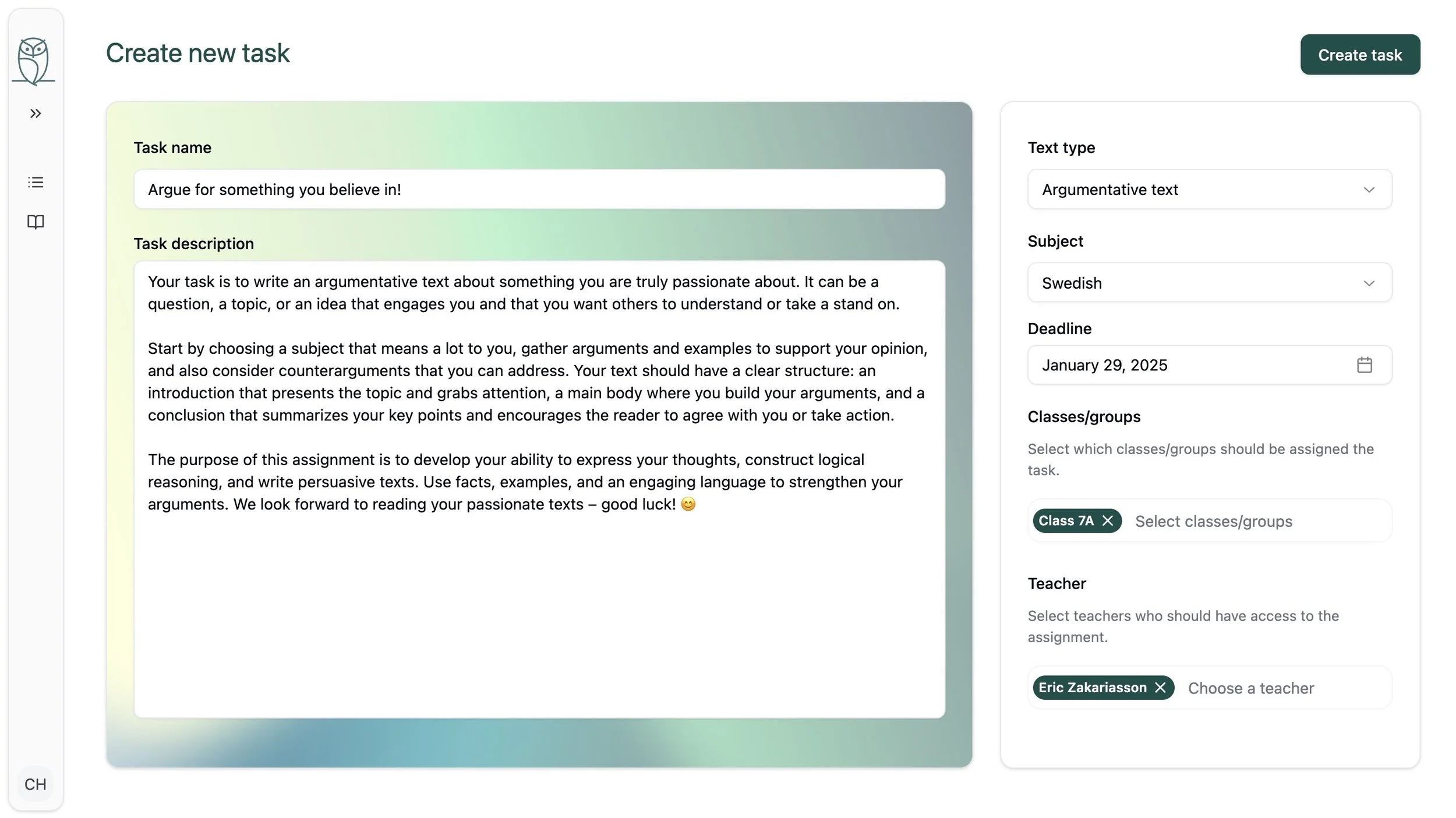Enhance writing skills with AI tailored for education.
Langoflow is an AI-driven platform that strengthens students’ writing development by providing immediate, pedagogical feedback aligned with curriculum. We help students reach their full potential while reducing teachers’ workload.
✔ Immediate feedback on students’ writing
✔ Workload relief for teachers
✔ GDPR-compliant data management
✔ Equitable AI for improved academic outcomes
Support students to achieve greater academic success
Give students the tools for success with direct, constructive feedback. Our AI provides clear guidance and motivation to continue developing, regardless of where they are in their learning journey.
This feedback can serve as a basis for instructional conversations in the classroom or as individual support for each student.
Langoflow adapts to every student—from those needing assistance to meet course objectives to high-achievers seeking their next challenge.
The response given to the student is grounded in genre pedagogy and the Swedish curriculum. It acknowledges the student’s efforts while also offering clear direction and motivation for ongoing

Simplify the teacher’s day-to-day work.
Reduce your workload and save time with AI that provides students with regular, constructive feedback—fully automatically.
Get a clear overview of student progress while further developing your expertise in language instruction, thanks to Langoflow’s text analyses in your classroom every day.
What teachers say about Langoflow:
“This is exactly the kind of feedback I know helps students grow, but I rarely have the time to provide.”
“Students are more motivated, and their improved proficiency with different text types benefits their learning in every subject.”
“When I use a chatbot, I have to rewrite the text to make it fit my teaching, but this one works perfectly right away.”

How it works
Langoflow is an AI-based writing development tool designed for grades 4–9. Students receive immediate, high-quality feedback showing what works well and what can be improved, motivating them to continue growing. The workflow is as follows:
Create assignment
The teacher selects a text type, adds their own description, and links one or more subjects to the assignment. If the assignment is cross-curricular, the teacher can also invite colleagues from other subjects to collaborate.
Introduce the text type
The teacher introduces the text type, either using their own materials or leveraging the resources available in Langoflow.
Students write texts
Students work on their texts individually, in pairs, or in groups. Once they have written a draft, they submit it to Langoflow and receive immediate feedback that highlights what they did well and shows what can be improved, based on genre, flow, and language accuracy.
Students refine their texts
Students can receive feedback any number of times, encouraging continuous improvement. Teaching becomes more feedback-oriented, ensuring that all students get the support they need to move forward in their writing development.
A tool for school success across topics
The tool currently includes fourteen text types aligned with the Swedish curriculum. Functionality for English texts will be added soon.
The language activities that students practice are crucial for success in all subjects, and we recommend using Langoflow for cross-curricular texts, enabling students to develop both writing skills and subject knowledge at the same time.
School-specific text types, such as lab reports, will also be added in the near future.
A smart writing platform that brings the curriculum's intentions to life.
AI should be utilized to help students achieve their full potential in the areas that matter most. That’s why Langoflow focuses on language development and writing, which are not only central to language learning but also fundamental tools for all other learning, as outlined in LGR22.
The Swedish curriculum states that students should “develop their linguistic abilities to think, communicate, and learn.” Assessment criteria also highlight that students should “learn to adapt texts to text type, purpose, audience, and context,” as well as “follow linguistic norms.” Additionally, it emphasizes the importance of students receiving feedback on their texts to develop these skills.
Langoflow enables students to build these abilities and provides the feedback they are entitled to, as specified in the curriculum..

Langoflow leverages AI to maximize pedagogical impact
The idea behind Langoflow is to leverage key success factors from researched and proven pedagogical approaches, such as genre-based pedagogy, formative assessment, and differentiated instruction. Below, Langoflow’s pedagogical foundations are presented in more detail.
Genre pedagogy
Genre pedagogy is a teaching method that focuses on explicitly teaching different text types and genres to strengthen students' language skills. By learning the structure and features of various genres, students improve their ability to understand and create texts across subjects. This equips them to express their thoughts and knowledge more effectively, supporting their academic success. Developed by researchers like Jim Martin, Joan Rothery, and Pauline Gibbons, genre pedagogy helps reduce language barriers and ensures greater access to educational content, making it a key element in language teaching and curricula worldwide.
Formative assessment
Formative assessment, also known as assessment for learning, is a process that identifies a student’s current knowledge level to provide forward-looking, constructive feedback for continued learning and development. The feedback should be specific, concrete, and tailored to each student’s needs, helping them understand what steps to take to progress in their learning. Research consistently shows that formative assessment positively impacts student success by making learning more engaging, increasing students’ awareness of their strengths and areas for improvement, and encouraging an active, reflective learning process. Developed by researchers like Dylan Wiliam, it emerged from the need to enhance education through continuous assessment and feedback. A common challenge, however, is that teachers often struggle to find time to assess student work and provide detailed feedback.
Differentiated Instruction
Differentiated instruction is a teaching strategy that adapts learning to meet each student’s individual needs and abilities. By varying content, processes, and outcomes, teachers can meet students at their current level and provide challenges that promote growth and learning. This approach helps students better understand and engage with the material, leading to increased motivation and improved academic performance. Research shows that differentiated instruction is particularly effective in supporting all learners, especially those needing extra help or greater challenges. Developed by researchers like Carol Ann Tomlinson, a leading figure in the field, this method originated in the United States to create inclusive and effective learning environments. However, a key challenge is that it demands significant time, planning, and resources from teachers to design and implement tailored instructional approaches.
Practice makes perfect
Langoflow also prepares students for the Swedish national writing test in grades 6 and 9. The test requires students to write a text in a specific genre, such as a short story, an opinion piece, a narrative, or a recount.
With the ability to receive unlimited feedback on texts in the genres included in the national test, students are well-equipped to approach the test with confidence and thorough preparation.
This approach also enhances equity, as students are no longer dependent on highly educated parents for additional practice before important exams.
-

Christer Holger
FOUNDER
Christer has a background as the founder, principal, and director of Skapaskolan in Huddinge. He has also worked on digital transformation in education with over 200 principals from Haparanda to Ystad. Christer's focus is on meaningful learning.
-

Mia Vestman
PEDAGOGICAL CONTENT PRODUCER
Mia Vestman is a Swedish teacher, educational material producer, and trainer. She has been engaged as an educational content producer for Langoflow's materials to ensure they align with curricula & sound pedagogy.
-

Patricia Diaz
ADVISOR
Patricia is a language teacher, educational author, and PhD candidate at the Royal Institute of Technology, researching response systems in digital learning. As an advisor, Patricia helps us leverage the strengths of language development approaches.
-

Dylan Wiliam
ADVISOR
Emeritus Professor of Educational Assessment Dylan Wiliam at the UCL Institute of Education is a world-leading expert in the field of assessment for learning. Dylan ensures that the product effectively leverages the success factors of formative assessment.
AI that benefits every teacher and every student!
Now that generative AI has arrived, schools need to use it in an equitable, straightforward, and safe manner. A professional and user-friendly school tool is necessary to help all teachers successfully integrate AI into their teaching. Only then can every student receive an equitable education supported by AI.
The tool must also make a tangible difference to students’ academic success and reduce teachers’ workload. Langoflow was developed to meet these needs.
Contact us
Do you want to get in touch to collaborate, know when Langoflow is avaliable in your geography or something else? Do not hesitate to contact us!











